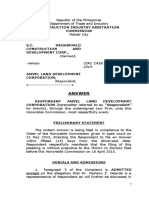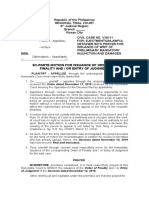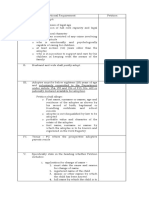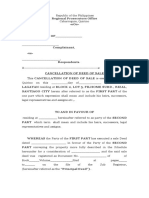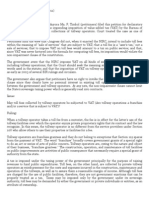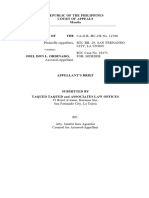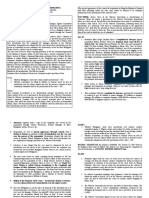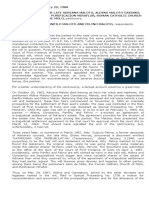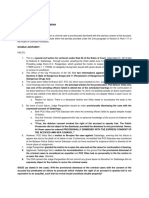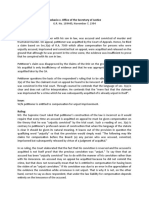Comment
Comment
Uploaded by
Arjay BalanquitCopyright:
Available Formats
Comment
Comment
Uploaded by
Arjay BalanquitCopyright
Available Formats
Share this document
Did you find this document useful?
Is this content inappropriate?
Copyright:
Available Formats
Comment
Comment
Uploaded by
Arjay BalanquitCopyright:
Available Formats
Republic of the Philippines SUPREME COURT Manila People of the Philippines, Complainant-Appellee,
-versus-
CRIMINAL CASE No. 2010-11-05
Hayden Co, Accused-Apellant.
x------------------------------------------x
COMMENT
APPELLEE, through counsel, in compliance of the Courts Order dated October 14, 2011 requiring Appellee to submit its Comment on the Petition for Review under Rule 45 of the Rules of Court of the Accused-Appellant, hereby states that:
1.
Appellee admits and incorporates herein as part of this Comment the allegations set forth in paragraphs 1 and 2 of the Petition insofar as the personal circumstances of the private complainant and the accused are concerned;
2.
Appellee also admits and incorporates herein as part of the Comment the material allegations as set forth in paragraphs 4, and 5 of the Petition;
3.
Apellee denies the facts as stated in paragraphs 6, 7, 8, and 9 and instead presents the proven statement of facts as found by the Regional Trial Court and the Court of Appeals:
STATEMENT OF FACTS
4.
At about 5 oclock in the early morning of September 1, 2010, private complainant Miriam Rivera-Dantes was sleeping alone at their conjugal house; her husband Bingbong Dantes having been away on an out-of-town trip;
5. Complainant was then awakened by a strong odor of gin; and she saw respondent Hayden Co wearing only his underwear beside her on their marital bed trying to embrace and kiss complainant;
6. Shocked at what was happening, complainant shouted for help, but respondent punched her in the abdomen; complainant shouted again for help and he punched her again, this time hitting her in her left breast;
7. Respondent
then held complainant
by the neck,
warning her not to shout again or else he will kill complainant;
8. Complainant tried to fight back and resist but to no avail as he had superior strength over her and she was also very afraid that he would carry out his threat of killing her;
9. Respondent then was lying on top of complainant, with his right hand covering complainants mouth to stifle her shouting and with his left hand lowered
complainants panties which he succeeded to take off;
10.
After taking off his underwear, respondent then
inserted his penis into complainants vagina and had carnal knowledge of her (copy of Medico-Legal
Certificate issued by Dr. Mickey Melo attached as Annex A;
11.
After respondent was through with having carnal
knowledge of the complainant, he then again warned her not to tell her husband or the authorities what happened or else he will kill her and her husband;
12.
Respondent then wore his pants and exited
through the complainants houses front door;
13.
Complainant then rushed to the front door and
shouted for help; she then saw her husbands cousin Dennis Trujillo outside and told him that respondent had raped her; although Mr. Trujillo was not able to catch respondent;
14.
Complainant, assisted by Mr. Trujillo and his wife, then went to their Barangay Captain to report the incident;
15.
Accompanied
by
the
Barangay
Captain,
complainant then went to the Sto. Tomas Police Station to report the crime done against her;
16.
In an Information dated December 1, 2010 accusedappellant was then charged with the crime of rape committed against the private complainant;
17.
On January 15, 2011, on the basis of warrant of arrest issued by Judge Maximo Asuncion of Branch XXV of the Regional Trial Court, the accused-appellant having made himself scarce since the incident, was arrested away from Sto. Tomas, in Naga City. The accused-appellant was consequently tried before the Regional Trial Court and was found guilty as charged with the crime of rape; On appeal before the Court of Appeals, the Court affirmed in toto the Decision of the Regional Trial Court;
18.
19.
20.
Consequently, the accused-appellant filed before
this Honorable Court, the instant petition for review on certiorari under Rule 45 of the Rules of Court; ISSUE
The Petition purported to have presented two issues as questions of law, to wit:
1.
Whether or not Petitioner is guilty of rape despite the failure of the prosecution to prove his guilt beyond reasonable doubt; and
2. Whether
the
trial
court
gravely
erred
in
not
considering the defense interposed by the accusedappellant.
ARGUMENT The prosecution did prove its case beyond reasonable doubt and consequently, the Regional Trial Court and the Court of Appeals did not err in finding accused-appellant guilty of the crime of rape.
DISCUSSION
The Petition did not raise questions of law
Elementary is the rule that a petition for review must only raise questions of law and not of fact. A cursory reading of Rule 45 of the Rules of Court provide: SECTION 1. Filing of petition with
Supreme Court.A party desiring to appeal by certiorari from a judgment or final order or resolution of the Court of Appeals, the Sandiganbayan, the
Regional Trial Court or other courts
whenever authorized by law, may file with the Supreme Court a verified The
petition for review on certiorari.
petition shall raise only questions of law which must be distinctly set forth. (Emphasis supplied.)
On the first issue, as to whether the prosecution failed to prove the guilt of the accused-appellant beyond reasonable doubt, the accused appellant anchors his hope of acquittal in this wise: The incident occurred in the dwelling house of the private complainant with her baby while the rest of the children were sleeping in the same house. While private complainant allegedly struggling to repel the attack against her honor, her baby was crying loudly. Hence it is impossible that the children who are just sleeping near the alleged room where the offense was committed are not awakened if there was indeed a struggle between private complainant and the accused. It is as glaring as the light of the midday sun that under the guise of ostensibly raising questions of law, the Petition
raised questions of fact. The Petition seeks to reverse and to put into question the findings of fact as found by the lower courts. By this ground alone the Petition should be dismissed outright. Settled is the rule that the Supreme Court is not a trier of facts. Pure issues of fact may not be the proper subject of appeal by certiorari under Rule 45 of the Revised Rules of Court as this mode of appeal is confined to questions of law (Liberty Construction vs. Court of Appeals, G.R. No. 106601, June 28, 1996).
Just to put a grievous hole in the theory of the accused about the impossibility of the rape happening under the
circumstances, the Supreme Court has this to say in People vs. Agbayani (284 SCRA 315, 340): The evil in man has no conscience, the beast in him bears no respect for time and place, it drives him to commit rape anywhere. In People vs. Mangompit, Jr. (G.R. No. 139962-66, March 7, 2001) the Supreme Court held that it was not impossible or incredible for the members of the complainants family to be in deep slumber as not to be awakened while the brutish sexual assault was committed. Lust respects no time and place (People vs. Nogpo, G.R. No. 184791, April 16, 2009).
Findings of fact of the trial court
are entitled to great weight
As correctly found by the trial court, private complainants version of rape by the accused-appellant is more credible and sounds more real. These findings of fact of the trial court are entitled to great weight (People vs. Apattad, G.R. No. 193188, August 10, 2011), as assessing credibility is the domain of the trial court (People vs. Nogpo, G.R. No. 184791, April 16, 2009).
Findings of fact of the appellate court are binding and conclusive upon the Supreme Court
The Court of Appeals further affirmed the findings of the trial court. In this regard, it is settled that when the trial courts findings have been affirmed by the appellate court, said findings are generally conclusive and binding upon the Supreme Court (People vs. Lingasa, G.R. No. 192187, December 13, 2010). All doubts as to the correctness of the conclusions are resolved in favor of the Court of Appeals (Pilar Development Corporation vs. IAC, G.R. No. 72283, December 12, 1986).
The accused took flight indicating his guilt of the crime
A square peg in a round hole of accused-appellants pretense of innocence is the fact that the accused-appellant took flight immediately after the incident. The records show that he was arrested some four months after the incident in a remote barangay of Naga City. Flight signifies an
awareness of guilt (People vs. Avero, G.R. No. 76483, August 30, 1988).
Even the wisdom of King Solomon finds an obvious indication of the guilt of the accused, as provided in the Bible in Proverbs 28:1, The wicked flee though no man pursue, but the righteous are as bold as a lion. This biblical precept has found jurisprudential application as evidence of guilt of the accused (People vs Mendoza, G.R. No. 113791, February 22, 1996).
The prosecution proved the guilt of the accused-appellant beyond reasonable doubt
The prosecution presented three witnesses: the private complainant whose direct and affirmative testimony proved the crime of rape committed against her by the accusedappellant; Dr. Mickey Melo, whose findings in the MedicoLegal Report and whose testimony corroborated the material allegations by the private complainant, proved that there was carnal knowledge and that the private complainant sustained injuries as result of the rape; and the testimony of Dennis Trujillo, whose testimony proved that the accused was present in the private complainants residence during the time of the incident.
In short, taken with the direct and affirmative testimony of private complainant, the findings of rape by the expert witness, and the corroborative testimony of the eyewitness, no other conclusion may otherwise be found: that the prosecution was able to prove the guilt of the accused beyond reasonable doubt, as found by the Regional Trial Court and as affirmed by the Court of Appeals.
Sweetheart theory as a defense in rape is inherently weak
Anent the second issue, the lower courts did not err in not considering the sweetheart defense of the accusedappellant.
The accused-appellant, in a desperate attempt to lend credence to his masquerade of innocence, decided to take shelter in the hole-filled ceiling of the sweetheart theory. In interposing this much-abused defense against the
accusation of rape, the accused-appellant only managed to cast serious doubts about his innocence and made the job of the prosecution to prove rape much easier.
The accused-appellant, by admitting carnal knowledge, must show by substantial evidence the supposed relationship (People vs. Amalfin, G.R. No. 124975, February 20, 2002). This accused-appellant woefully failed to do.
First, accused-appellants claim that he and the private complainant were sweethearts is self-serving and inherently weak (People vs. Nogpo). This became even weaker when supported by a friend whose testimony deserves scant consideration.
Second, accused appellant, despite his wild fantasies of illicit relationship with the private complainant, did not even present any text message, love letter, memento, nor pictures as proof of the supposed adulterous relationship (People vs. Casao, G.R. No. 100913, March 23, 1993). A sweetheart defense to be credible, should be
substantiated by some documentary or other evidence of the relationship (People vs. Garces, G.R. No. 132368, January 20, 2000).
Third, even granting arguendo that the accused-appellant and private complainant were indeed adulterous lovers, rape could still be committed if he had carnal knowledge with the private complainant against her will (People vs. Vallena, G.R. No. 106283, June 1, 1995). A love affair does not justify rape (People vs. Garces) nor is it a license for lust (People vs. Manahan, G.R. No. 128157, September 29, 1999).
The theory of accused-appellant tried to swim against the torrential current of the law, evidence, and well-entrenched jurisprudence, but ultimately drowned.
Taking all of these in consideration, the accused-appellant failed to present any convincing reason why this Honorable
Court should overturn the findings of the courts below. Hence, the judgment of guilt must be affirmed.
PRAYER
IN VIEW OF THE FOREGOING, the complainant-appelle, respectfully prays the Court to affirm the Decision of the Court of Appeals finding the accused-appellant Hayden Co guilty beyond reasonable doubt of the crime of rape, sentencing him to suffer the penalty of reclusion perpetua and ordering him to pay the offended party P 50,000 as civil indemnity and P 50,000 as moral damages. 17 October, 2011. Makati City. MARCUS AURELIUS Assistant Solicitor-General
You might also like
- Hinds V RDocument20 pagesHinds V RPrenita Ramcharitar100% (1)
- Motion For Writ of GarnishmentDocument3 pagesMotion For Writ of GarnishmentGary Detman0% (1)
- Republic of The Philippines Office of The President Northern Tagalog Regional Field Office-III 3 Floor, Insular Life BLDG, San Fernando, PampangaDocument10 pagesRepublic of The Philippines Office of The President Northern Tagalog Regional Field Office-III 3 Floor, Insular Life BLDG, San Fernando, PampangaChloe Sy GalitaNo ratings yet
- Answer: Claimant, Ciac Case No. 62-A & B-2014Document18 pagesAnswer: Claimant, Ciac Case No. 62-A & B-2014Jil BongalonNo ratings yet
- A.M. No. 07-4-15-SCDocument26 pagesA.M. No. 07-4-15-SCSharmen Dizon GalleneroNo ratings yet
- Tro NLRC CaseDocument14 pagesTro NLRC CaseEdwin Villa100% (1)
- NDC Vs PVB (Digest)Document2 pagesNDC Vs PVB (Digest)Arjay Balanquit100% (5)
- Notice of Appeal DraftDocument1 pageNotice of Appeal DraftYanyan AlicandoNo ratings yet
- Republic of The PhilippinesDocument6 pagesRepublic of The PhilippinesAlexis EnriquezNo ratings yet
- Formal EntryDocument2 pagesFormal EntryMOSB10No ratings yet
- Withdraw Appeal To SC - 07292015Document2 pagesWithdraw Appeal To SC - 07292015alwayskeepthefaith8No ratings yet
- Legitime in Testate Succession: Mortis (Time of Death)Document6 pagesLegitime in Testate Succession: Mortis (Time of Death)No MercyNo ratings yet
- 2nd Motion For Extension TemplateDocument2 pages2nd Motion For Extension Templatejowel clomaNo ratings yet
- Urgent Motion For Early ResolutionDocument2 pagesUrgent Motion For Early ResolutionAli100% (1)
- Public Attorney'S Office Cabagan District Office: - versus-NPS Docket No. II-04-INQ-20F - 00074 For: Frustrated MurderDocument6 pagesPublic Attorney'S Office Cabagan District Office: - versus-NPS Docket No. II-04-INQ-20F - 00074 For: Frustrated MurderYNNA DERAYNo ratings yet
- Affidavit of Acknowledgement of Paternity PAODocument2 pagesAffidavit of Acknowledgement of Paternity PAOFulgue JoelNo ratings yet
- Motion To Issue Finality of JudgmentDocument2 pagesMotion To Issue Finality of JudgmentDoit Etre SebastianNo ratings yet
- Sample MotEx CustodySupportDocument3 pagesSample MotEx CustodySupportRhyz Taruc-ConsorteNo ratings yet
- Summons: BFAR 7, Represented by JOSEFINA D. Flores, Administrative Case NoDocument6 pagesSummons: BFAR 7, Represented by JOSEFINA D. Flores, Administrative Case NoFulgencio Dos PalosNo ratings yet
- 001 Pre ProclamationDocument2 pages001 Pre ProclamationJoan PabloNo ratings yet
- Offer To Plead Guilty To A Lesse CrimeDocument4 pagesOffer To Plead Guilty To A Lesse CrimeNestoni M. SenarillosNo ratings yet
- Hilda P. Eom,: Petitioner. XDocument4 pagesHilda P. Eom,: Petitioner. XHarold EstacioNo ratings yet
- Position Paper: Plaintiff, Case No.: - Versus - For: Unlawful DetainerDocument23 pagesPosition Paper: Plaintiff, Case No.: - Versus - For: Unlawful DetainerMeynard MagsinoNo ratings yet
- Jurisdictional Requirement For AdoptionDocument2 pagesJurisdictional Requirement For AdoptionBoletPascuaNo ratings yet
- Motion For Approval of Compromise AgreementDocument2 pagesMotion For Approval of Compromise AgreementcarinokatrinaNo ratings yet
- General Power of AttorneyDocument2 pagesGeneral Power of Attorneyjovani ema0% (1)
- Demand Letter To Take Down Facebook PostDocument2 pagesDemand Letter To Take Down Facebook PostEvelyn ReguetaNo ratings yet
- 46 Petition For Review RTC CADocument18 pages46 Petition For Review RTC CAChristine Joy PrestozaNo ratings yet
- Lack of Notarization CertificationDocument3 pagesLack of Notarization CertificationWeng SantosNo ratings yet
- Catbagan Position PaperDocument8 pagesCatbagan Position PaperattymelNo ratings yet
- Motion For Approval of Compromise Agreement FormDocument2 pagesMotion For Approval of Compromise Agreement FormLook ArtNo ratings yet
- Republic of The Philippines Regional Trial Court National Capital Judicial Region Makati-Branch 143Document2 pagesRepublic of The Philippines Regional Trial Court National Capital Judicial Region Makati-Branch 143bobbyrickyNo ratings yet
- Motion For ReconsiderationDocument8 pagesMotion For ReconsiderationManny B. Victor VIIINo ratings yet
- Comment On Petition For Certiorari PDFDocument6 pagesComment On Petition For Certiorari PDFDiana Constantino-RocaberteNo ratings yet
- Manifestation For Advance Copies IDocument2 pagesManifestation For Advance Copies IAndres ViacrusisNo ratings yet
- Addendum To The Complainants' Motion To DismissDocument3 pagesAddendum To The Complainants' Motion To DismissAguilar John FrancisNo ratings yet
- Motion For Leave To Serve Summons by PublicationDocument4 pagesMotion For Leave To Serve Summons by PublicationJane HeartyNo ratings yet
- Case Form No. 1 Rem ComplaintDocument6 pagesCase Form No. 1 Rem ComplaintAtty. Lynn Elevado100% (1)
- Cases For Annulment of TitleDocument5 pagesCases For Annulment of TitleLucille TevesNo ratings yet
- Petition For Extra Judicial Foreclosure of Real Estate Mortgage Under Act 3135 As AmendedDocument1 pagePetition For Extra Judicial Foreclosure of Real Estate Mortgage Under Act 3135 As AmendedGerwin100% (1)
- Waiver of AppearanceDocument2 pagesWaiver of AppearanceKayelyn LatNo ratings yet
- Demurrer To EvidenceDocument2 pagesDemurrer To EvidenceBrandon BanasanNo ratings yet
- Ex Parte Motion To Set Case For Pre TrialDocument3 pagesEx Parte Motion To Set Case For Pre TrialTo Ug HieNo ratings yet
- Motion To Declare Defendant in Default (Pro Forma)Document3 pagesMotion To Declare Defendant in Default (Pro Forma)Erin GamerNo ratings yet
- Motion To Cite Witness For ContemptDocument3 pagesMotion To Cite Witness For ContemptJoemar CalunaNo ratings yet
- Motion To Revive-SampleDocument1 pageMotion To Revive-SampleNadzlah BandilaNo ratings yet
- Declaration of Employer and Counsel As To Genuineness of Appeal BondDocument2 pagesDeclaration of Employer and Counsel As To Genuineness of Appeal BondJoemar CalunaNo ratings yet
- Deed of CancellationDocument2 pagesDeed of Cancellationmkab100% (1)
- Affidavit of MeritDocument2 pagesAffidavit of MeritFS YNo ratings yet
- Habeas CorpusDocument3 pagesHabeas CorpusEllaine Virayo100% (1)
- Manifestation To Withdraw Cash DepositDocument2 pagesManifestation To Withdraw Cash DepositNodlesde Awanab ZurcNo ratings yet
- Reso Truck Ban Parking 2018Document2 pagesReso Truck Ban Parking 2018International Home DecorsNo ratings yet
- Motion For Extension of Time To File Answer Ad Cautelam: Penshone Inc.Document4 pagesMotion For Extension of Time To File Answer Ad Cautelam: Penshone Inc.Steph RentNo ratings yet
- Petition For Issuance of Owners Copy of Title OppositionDocument2 pagesPetition For Issuance of Owners Copy of Title OppositionMärinël VëlmöntëNo ratings yet
- Hsac Case Form No. 3 AnswerDocument4 pagesHsac Case Form No. 3 AnswerPaolo Lucion100% (1)
- Act No 1120 FRIAR LANDS ACTDocument6 pagesAct No 1120 FRIAR LANDS ACThannahNo ratings yet
- Very Urgent Motion For Resolution (Hilario)Document5 pagesVery Urgent Motion For Resolution (Hilario)Prince NeyraNo ratings yet
- Regional Trial Court: Plaintiff-Appellee'S MemorandumDocument5 pagesRegional Trial Court: Plaintiff-Appellee'S MemorandumRosemarie Aldas Casurra100% (1)
- SuccessionDocument28 pagesSuccessionAngelo Andro SuanNo ratings yet
- Motion To Suspend or Held in Abeyance Proceedings COMES NOW, ACCUSED Through Counsel and To ThisDocument1 pageMotion To Suspend or Held in Abeyance Proceedings COMES NOW, ACCUSED Through Counsel and To ThisjuliecorneNo ratings yet
- Investigation Data FormDocument1 pageInvestigation Data FormCatherine Rose DiazNo ratings yet
- RTC MemorandumDocument4 pagesRTC Memorandummuton20100% (1)
- People Vs MagatDocument10 pagesPeople Vs MagatStephen SaavedraNo ratings yet
- Diaz Vs Sec of FinanceDocument1 pageDiaz Vs Sec of FinanceArjay Balanquit100% (3)
- 1964 Rules of Court of The PhilippinesDocument1 page1964 Rules of Court of The PhilippinesArjay BalanquitNo ratings yet
- Feb 7-10Document3 pagesFeb 7-10Arjay BalanquitNo ratings yet
- Appellants BriefDocument14 pagesAppellants BriefthinmajickNo ratings yet
- Supreme Court: Crisostomo M. Diokno For Plaintiff-Appellants. Andres Franco For Defendants-AppelleesDocument115 pagesSupreme Court: Crisostomo M. Diokno For Plaintiff-Appellants. Andres Franco For Defendants-AppelleesVernis VentilacionNo ratings yet
- Safeguars of LibertyDocument15 pagesSafeguars of Libertygulmehak chandhokNo ratings yet
- Lhuillier vs. British AirwaysDocument3 pagesLhuillier vs. British AirwaysRenzo Ross SarteNo ratings yet
- United States v. Cerno, 10th Cir. (2007)Document5 pagesUnited States v. Cerno, 10th Cir. (2007)Scribd Government DocsNo ratings yet
- Possession-Dispossession - Recovery of PossessionDocument17 pagesPossession-Dispossession - Recovery of PossessionManjare Hassin RaadNo ratings yet
- HAYNES v. STATE OF FLORIDA - Document No. 3Document3 pagesHAYNES v. STATE OF FLORIDA - Document No. 3Justia.comNo ratings yet
- Succession From Article 828 1105Document600 pagesSuccession From Article 828 1105pit1xNo ratings yet
- Pre Trial Order PARTITIONDocument6 pagesPre Trial Order PARTITIONHarriet Marie FranciscoNo ratings yet
- LW - Leonor Vs CA G.R. No. 112597. April 2, 1996Document6 pagesLW - Leonor Vs CA G.R. No. 112597. April 2, 1996Mel Manatad100% (1)
- Double JeopardyDocument6 pagesDouble JeopardyBananaNo ratings yet
- Article IIDocument5 pagesArticle IIElleNo ratings yet
- The Great Plebeian Alaminos City, PangasinanDocument16 pagesThe Great Plebeian Alaminos City, PangasinanGuki SuzukiNo ratings yet
- Criminal Procedure DraftDocument6 pagesCriminal Procedure DraftAllen MoyoNo ratings yet
- Polity McqsDocument5 pagesPolity McqsAnonymous RJgVMGIaNo ratings yet
- Cruz V MijaresDocument2 pagesCruz V MijaresNap Gonzales100% (2)
- JT AppxDocument247 pagesJT AppxJamie WhiteNo ratings yet
- Republic of The Philippines Regional Trial Court 6 Judicial Region Branch No. Iloilo CityDocument4 pagesRepublic of The Philippines Regional Trial Court 6 Judicial Region Branch No. Iloilo CityJeremiah BantigueNo ratings yet
- Latest Decisions On Labor StandardsDocument25 pagesLatest Decisions On Labor StandardsDon So HiongNo ratings yet
- Aguirre II vs. FQB+7, Inc.Document8 pagesAguirre II vs. FQB+7, Inc.Per-Vito DansNo ratings yet
- Saldariega v. Hon. PanganibanDocument3 pagesSaldariega v. Hon. PanganibanitsmestephNo ratings yet
- Naguit vs. Court of AppealsDocument2 pagesNaguit vs. Court of AppealsStag YuNo ratings yet
- Bacaro V CaDocument4 pagesBacaro V CaAllen GrajoNo ratings yet
- Faculty of Law (FOL) : PIL 0012 Introduction To Law Foundation in LawDocument5 pagesFaculty of Law (FOL) : PIL 0012 Introduction To Law Foundation in LawNavneetaa KeerbananthanNo ratings yet
- Interpretation of StatuteDocument27 pagesInterpretation of StatuteShailesh BansalNo ratings yet
- Statcon - Basbacio v. SOJDocument1 pageStatcon - Basbacio v. SOJMia Dee-AbdNo ratings yet
- Tacay vs. Tagum G.R. Nos. 88075-77Document2 pagesTacay vs. Tagum G.R. Nos. 88075-77Marianne AndresNo ratings yet



